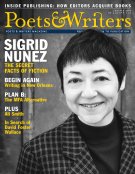In the midst of all those nervous conversations and the constant disquiet, writing, for me, became a still center. Let me add nuance to that: I have been a freelance writer and editor since graduate school. In that time, I’ve had many sublime moments and hours absorbed in the pleasures of articulating an idea or finding my way around to one. I’ve also known the pressure of having to work quickly, when every word I typed or edited was directly tied to my income. Unfortunately, the last few years have seen more of the latter dynamic than the former.
But there I was, stealing away each day to spend hours in a crisp, new public library, ensconced at a semiprivate desk with a laptop in front of me and my professional slate wiped clean. In my post-Katrina, limbo world, I was suddenly free to reflect on what had happened and to meander—albeit inconclusively—around its meaning.
The composer Philip Glass once told me that the best part of his career was in the early years, when he would present his compositions to a New York loft audience of five people (“and one of them was my mother”). He said it was the most liberating time of his life: He was free to do absolutely anything because absolutely no one cared what he was doing.
I won’t liken myself to Glass, but I certainly felt the uncluttered pleasures of pure writing in those weeks of working at my little desk in the library. Surrounded by the accumulating entries to the public discourse about Katrina—some coming now from professional acquaintances and friends—I staked my own small, idiosyncratic space there, sorting through questions, images, emerging structures of thought, arguments. I had a fixed, indefatigable sense of purpose, and writing was drawing an essential line through it.
The process of reasserting our lives—mine, my wife’s, our friends’ and neighbors’, the city’s own—will be slow and uncertain. I don’t know how it will all turn out. But in confronting Katrina, resolutely now from the library desk, I had an edge. And something more than that, really. Before Hurricane Katrina destroyed my city, I wrote. Now I was a writer.
Michael Depp is working on a book, The End of Easy, about life in post-Katrina New Orleans.








